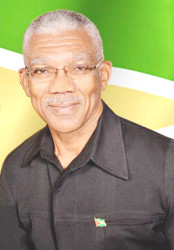The appointment of new foreign mission heads was based on merit and was not a form of reward, President David Granger said last evening even as he called on them to put the border controversy with Venezuela on the front burner.
Granger was at the time delivering the feature address at the closing ceremony of an orientation programme created especially for the heads of missions new to the Foreign Service.
He told the new heads and other Foreign Service representatives who were present that diplomats are appointed to represent the national interest and this comes after hard work. “It is not an appointment for party supporters and I would like to feel that your appointments have been based on merit,” he said, while adding that this concept is difficult for some people to understand as they believe that there should be “some patronage, some reward system.”

He said that the government is aiming at the creation of a professional service, in which Foreign Service officers would receive a range of exposure. “Foreign Service is not a face of party patronage. It’s… hard work and a face for professionalism and anyone who has served long enough in one of our missions will know that it is not a place where you can simply flaunt your own interests to the prejudice of the country which you represent,” he added.
“Being a diplomat overseas requires that you represent the national interest and when people look to you… at you… upon you, they see the best values of the Cooperative Republic of Guyana and it is for that reason that the Foreign Service Minister and I have had to defend some appointments, that we will continue to make appointments based on merit,” he further said.
The President, speaking on the issue of security and territorial integrity, said that unless the controversy with Venezuela is resolved, “we will not be able to attract the quality of investors, the numbers of investors and develop a huge part of our economy. It is a factor.”
He stressed that many do not realise that last October the Venezuelan Ambassador in Ottawa wrote to the principals of Guyana Goldfields, “threatening them with litigation and accusing them of trespassing on Venezuelan territory… Venezuelans have been scaring away investors for fifty years, contributing to under development.”
Granger said some may be seeing Guyana’s continuous objections as complaining but urged diplomats posted overseas to ensure that they had a thorough grounding in the issue so that it can pursued where ever they are.
“We have to put that in the forefront of our diplomacy—that out territory is not going to be bargained… you have to believe that you can’t go to the bargaining table after 50 years or more and believe the best way to overcome the territorial problem is not to talk about it,” he said, while adding that even though government is trying to get it resolved with the help of the United Nations it should be on the front burner.
“We need to work to ensure that all of our diplomats, every member of staff understands the territorial problem thoroughly and can speak up in any forum,” he added.
Granger also spoke of the importance of diversifying Guyana’s economy, the political structure and social cohesion.
Meanwhile, Foreign Affairs Minister Carl Greenidge said that this batch constitutes persons who have not had, for the most part, “any formal diplomatic postings… [or] have not been within the Ministry of Foreign Affairs before.” He said the ministry tried as far as it could to ensure that they were not only equipped with the traditional tools and understanding of the Ministry of Foreign Affairs—that is, diplomatic matters, political diplomacy and administration of foreign affairs—but “we tried explicitly to …include in the programme those aspects of the evolving international environment that we believe would be essential for them to perform their duties properly.”
Greenidge said that it is in this regard that areas such as money laundering, trafficking in persons and terrorism were discussed during the one-week orientation programme.
The new heads of missions include Dr Kenrick Hunte, High Commissioner to South Africa; Michael Ten-Pow, Permanent Representative to the UN; Dr Shamir Ally, the Head of Mission to Kuwait, Dr David Pollard, High Commissioner to India; and Barbara Atherly, New York Consular General.
Now that the programme has been completed, the new heads will be deployed to their various posts overseas.





